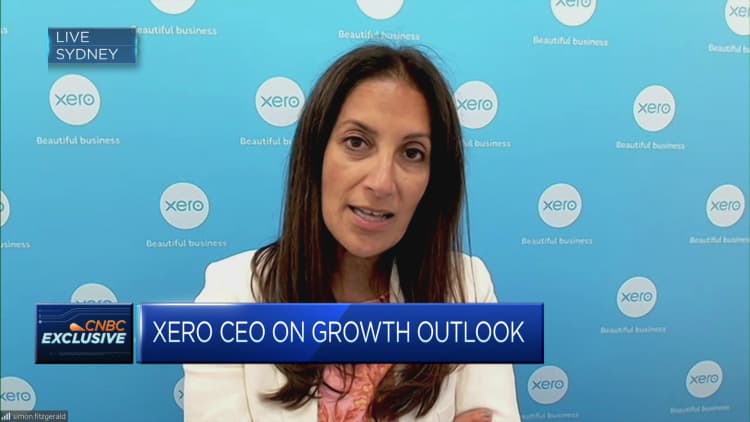Nick Martin, co-founder and CEO of Joe Coffee, is so concerned about the state of the economy that he’s looking for ways his company can save money. One main area for cuts: software.
Martin started the Seattle-based company with his brother, Brenden, to help local coffee shops better compete with Starbucks, by making it easier for them to fulfill mobile orders, track analytics and automate their marketing.
While their 8-year-old business has held pretty steady through the economic dip that started in 2022, Martin said he’s seeing evidence that people are now buying fewer lattes than they did a year ago. Any consumer slowdown is a potentially troubling sign for Joe Coffee’s customers, and the company is proactively tightening its belt.
Martin, 38, told CNBC that Joe Coffee has reduced its number of subscriptions to HubSpot, a marketing automation software vendor, and is closely examining its spending with payment processor Stripe to see if its agreement with the company will be worth renewing.
“Every subscription we have is under a magnifying glass,” Martin told CNBC. “We have to have a really good business case to do new expenditures.”
The Martin brothers aren’t alone, based on the latest earnings reports from software businesses that serve small and medium-sized businesses (SMBs), which could be your local shoe store, a small restaurant chain or the neighborhood spa.
HubSpot, Bill Holdings, Paycom and ZoomInfo all warned investors of potential trouble on the horizon. Their comments reflect broader economic data, which shows that consumers are feeling the ongoing effects of inflation and high interest rates.
Retail sales for October fell 0.1%, underscoring pressure from higher prices. The consumer price index for last month increased 3.2% on an annual basis, according to the Bureau of Labor Statistics.
Wall Street is on edge. While broad market indexes are up slightly since midyear, tech companies that specialize in the SMB space are hurting.
Paycom, which provides payroll and human resources software, saw its stock plunge 38% on Nov. 1, the day after the company said revenue growth in 2024 would be 10% to 12%, way below analysts’ expectations for growth above 20%.
Two days after Paycom’s drop, shares of Bill plummeted 25%. The company, whose software helps clients track and control their payables and receivables, reduced its profit and revenue guidance for 2024. Bill’s finance chief, John Rettig, said on the earnings call that the company is “operating in an environment of increasing economic choppiness and small businesses are under increasing pressure to adjust to the current realities.”
On the last day of October, ZoomInfo shares tumbled 16% on a weaker-than-expected forecast for the fourth quarter. CFO Cameron Hyzer told analysts that it “continues to be a tough world out there” for revenue retention. ZoomInfo helps sales and marketing teams track leads and customers.
HubSpot shares dropped 6.1% after its earnings report last week, though the stock has since recovered. The company’s outlook was largely in line with estimates, but growth is slowing and CEO Yamini Rangan described the environment as “choppy and challenging” with clients “continuing to optimize spend.”
“Sales cycles remain lumpy, budgets are still under scrutiny and buying urgency remains low,” Rangan said on the earnings call.
Representatives from Paycom, ZoomInfo, HubSpot and Bill didn’t respond to requests for comment. Since June 30, the stocks are down between 12% and 49%. The Nasdaq is up more than 2% over that stretch.
Fighting for the little guy
The sector of the market those companies serve is critical to the domestic economy. Over the past two decades, small businesses have accounted for 40% of U.S. gross domestic product, according to the Chamber of Commerce. They also employ 46% of the American workforce.
Jake Dollarhide, CEO of Longbow Asset Management, said results from Paycom and other SMB providers offer a window into the state of the economy.
“Anytime people don’t feel wealthy, they tend to pull back,” said Dollarhide.
The Martins know what it’s like dealing with the everyday challenges of making ends meet. Their father’s small business made sheds in their hometown of West Richland, Washington, about 200 miles southeast of Seattle, until bigger companies came into town and ran it into the ground.
“If America is really built on the backbone of small business owners, why are they the ones that never catch the break?” said Brenden Martin, Nick’s younger brother. “Why isn’t there anybody out there fighting for them? For us, that’s our primary driver.”
The Martin brothers have backgrounds in technology. They both worked at Microsoft, and Nick went from there to Zillow, while Brenden had jobs in product strategy and web development at various companies.
They also both loved the role coffee shops play in communities, having worked as baristas in the past, and wanted to help small cafes fend off Starbucks.
When Starbucks launched mobile ordering in 2015, Joe Coffee wasn’t yet up and running. But the brothers could see an imminent opportunity in the market.
“At first we were like, crap we missed our shot,” Brenden said. “And then we realized, well no, small businesses still need this.”
They got their big break in August 2018 at Coffee Fest, a venue for coffee brands to debut their products and services. Just before the event in Los Angeles, the Martins learned they’d received $1 million in funding, their first outside investment.
They initially built a mobile-order-only platform, but the Covid pandemic created a whole new set of demands from customers who were struggling to stay afloat. In 2021, Joe Coffee, which now has 17 employees, created a full software and payments suite for coffee shops.
For Joe Coffee’s business to work, its technology has to create almost immediate revenue and profit gains for its customers, which are already operating on tight budgets. The company doesn’t charge a recurring subscription, but only a percent of each transaction.
‘Nice to have’
Nick Martin cited higher borrowing costs as a main reason that Joe Coffee has reduced the number of software products it buys. The company now has roughly six software subscriptions, down from 12 to 15, accounting for 3% to 5% of operating expenses, down from around 8%, he said.
Decisions on what to get rid of are based on whether a product is a “nice to have” or is essential to business operations.
“Can we get away with just doing this in a spreadsheet?” he said. That’s how the company decided which HubSpot services to cut. Joe Coffee is still a HubSpot subscriber but is paying for fewer seats and fewer tools, Martin said.
As for Stripe, which is privately held, Joe Coffee is looking for other payment processors that have lower fees, Martin added.
Stripe said it doesn’t comment on specific customers.
The macroeconomic story will show up differently for software companies, depending on their revenue models and their reliance on certain industries.
Bill could see a more immediate impact than others because more than three-quarters of its core revenue comes from the money it makes on transactions, while the rest comes from subscriptions, which are contract based.
“What Bill is more exposed to would be the payment volume that’s coming from those SMBs,” said Taylor McGinnis, an analyst at UBS who follows Bill, ZoomInfo and HubSpot.
Investors across the sector are trying to figure out if SMB spending has bottomed or if businesses are still looking for opportunities to slim down their software portfolio should the economic picture dampen further.
“I think what we’ve learned, especially in B2B, is it’s more macro driven than we’re used to,” said Bryan Keane, an analyst at Deutsche Bank who covers software and payments companies. “If there’s another shoe to drop, there’s still going to be some downside risk.”
WATCH: Xero will remain focused on core segments such as small businesses

Don’t miss these stories from CNBC PRO:
Read the full article here




